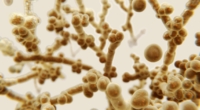Research chemist Ondulla Toomer is interested in exploring the potential of peanuts in women’s health, particularly in mitigating menopause symptoms. Peanuts are not tree nuts, but rather a sister legume of soybeans. Soy is commonly used to treat hot flashes in menopausal women because it has some estrogen-like effects, and in some Asian countries, peanuts are used as well. Toomer’s primary research is identifying new uses for peanuts and peanut byproducts within animal food production and the food industry. Additionally, she studies peanut components as functional food ingredients that offer health benefits. Her research has helped nutritionally enrich meat and eggs using peanuts and peanut byproducts as alternative poultry feed ingredients. Peanut skins contain bioactive compounds that have potential for treating blood disorders and possibly menopause symptoms. In future studies, Toomer plans to examine how peanuts and their bioactive components can be used as functional food ingredients to mitigate women’s reproductive health issues.
Peanuts: A New Superpower for Relieving Menopause Symptoms
Recent research suggests that peanuts, a protein-packed legume, may have a new superpower in relieving menopause symptoms. Ondulla Toomer, a research chemist with the U.S. Department of Agriculture’s Agriculture Research Science (USDA-ARS), is interested in exploring the potential of peanuts in women’s health.
Toomer is passionate about women’s health-related issues, nutrition, and scientific research. She notes that women’s health and nutrition are often overlooked, and she is dissatisfied with the advice provided for women as their bodies change and age. Women’s bodies change every 10 years and require different nutrients as they move from young women to childbearing years and, eventually, menopause.
The primary arm of Toomer’s research for USDA-ARS is identifying new uses for peanuts and peanut byproducts within animal food production and the food industry. Toomer’s research has helped nutritionally enrich meat and eggs using peanuts and peanut byproducts as alternative poultry feed ingredients. Feeding clean natural feed ingredients to poultry can enhance the nutrition and quality of the eggs or meat produced for human consumption. This leads to improved health for poultry and humans.
Additionally, Toomer studies peanut components as functional food ingredients that offer health benefits. For example, in a study published last year, Toomer revealed that peanuts can reduce or prevent diet-induced fatty liver disease in mice. This discovery led to a connection that is influencing her current research.
Toomer discovered that peanut skins have been used in Chinese medicine to treat blood disorders. This revelation inspired her to think about other uses for peanut skins. Peanut skins contain bioactive compounds such as resveratrol, which is known to have anti-inflammatory, antioxidant, and anti-cancer properties.
Toomer explains that peanuts are a sister legume of soybeans and are not a tree nut. Soy is used for menopausal women to treat hot flashes because it has some estrogen-like effects. And in some Asian countries, they use peanuts to treat it as well. North Carolina is one of the top producers of peanuts in the Southeast. Currently, there are a multitude of alternative therapies for women’s reproductive health issues using soy, but none on the U.S. market that incorporate peanut by-products.
In conclusion, peanut research, and women’s health may benefit from a new collaboration inspired by the research of Ondulla Toomer. Women’s health is often overlooked, and peanuts may offer a new source of relief for menopause symptoms. Peanuts and peanut byproducts have proven to be valuable in animal feed and functional food ingredients that offer health benefits. Peanut skins contain bioactive compounds that have potential for treating blood disorders, and possibly, menopause symptoms.
Peanuts May Mitigate Women’s Reproductive Health Issues
Research chemist Ondulla Toomer plans to examine how peanuts and their bioactive components can be used as functional food ingredients to mitigate women’s reproductive health issues. Peanuts are widely grown in the U.S. Southeast, and Toomer hopes to find a greater utilization and utility within animal feed and human food systems.
In 2023, Toomer’s peanut research will parallel some of the studies that have already been done with soybeans. Her hope is to prove that peanut skins can be beneficial to human health and provide a natural way to achieve health and wellness. Toomer’s focus is on overlooked issues, specifically women’s health. She believes that there needs to be a new thought process for women and health and nutrition, and she aims to discover it.
Don’t miss interesting posts on Famousbio










